Module 3 Unit 2There were few doctors, so he had to work very hard on his own.课件
文档属性
| 名称 | Module 3 Unit 2There were few doctors, so he had to work very hard on his own.课件 | 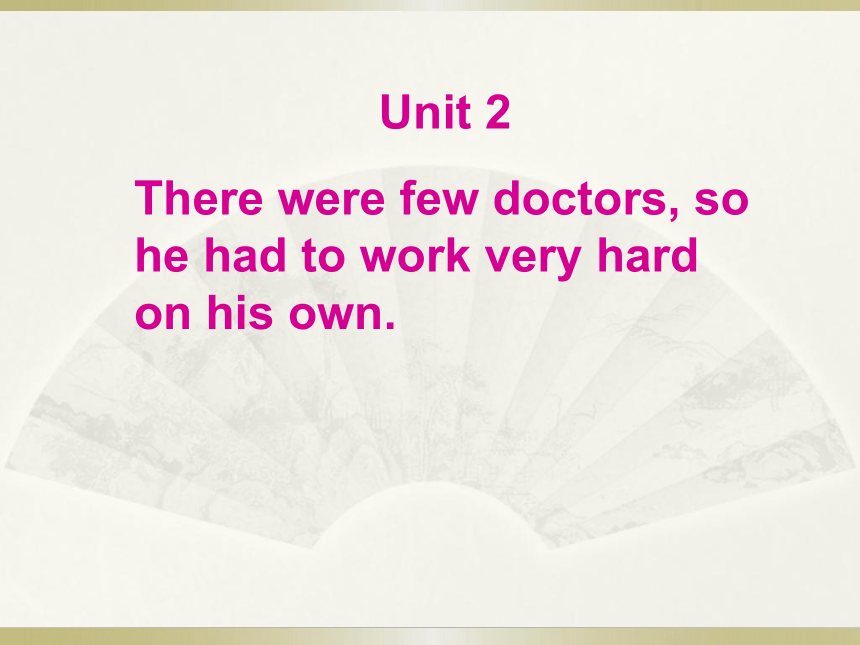 | |
| 格式 | ppt | ||
| 文件大小 | 1.7MB | ||
| 资源类型 | 教案 | ||
| 版本资源 | 外研版 | ||
| 科目 | 英语 | ||
| 更新时间 | 2017-09-22 14:28:09 | ||
图片预览

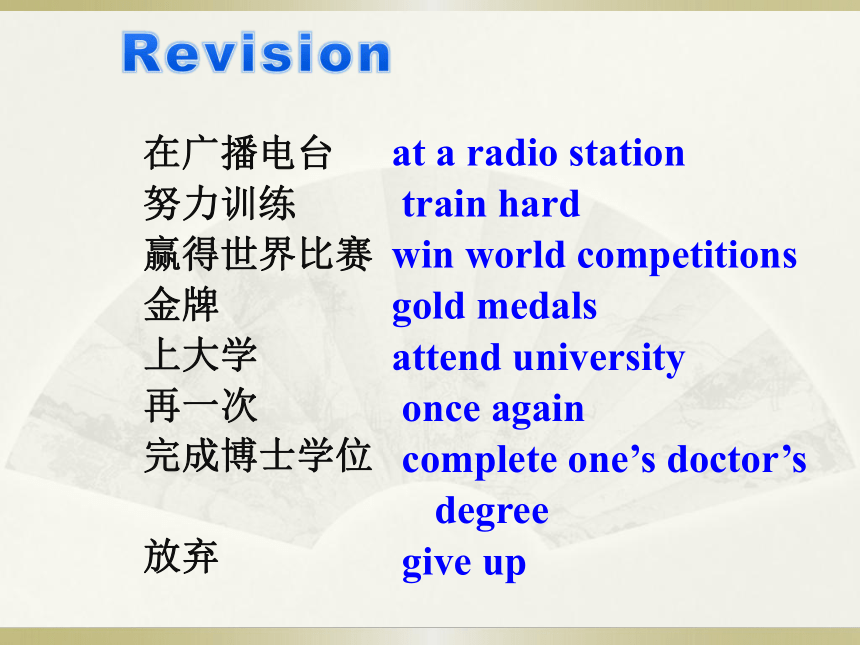
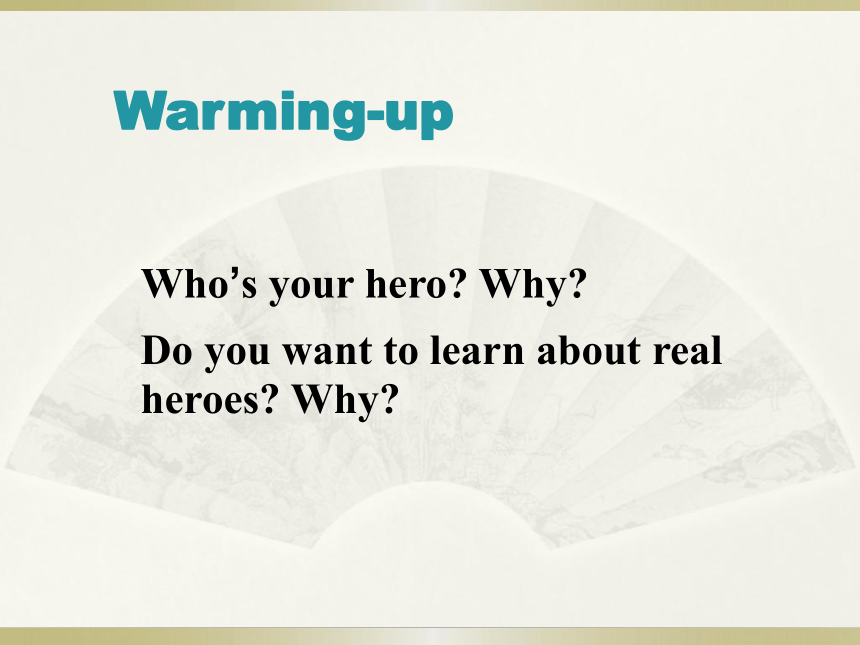
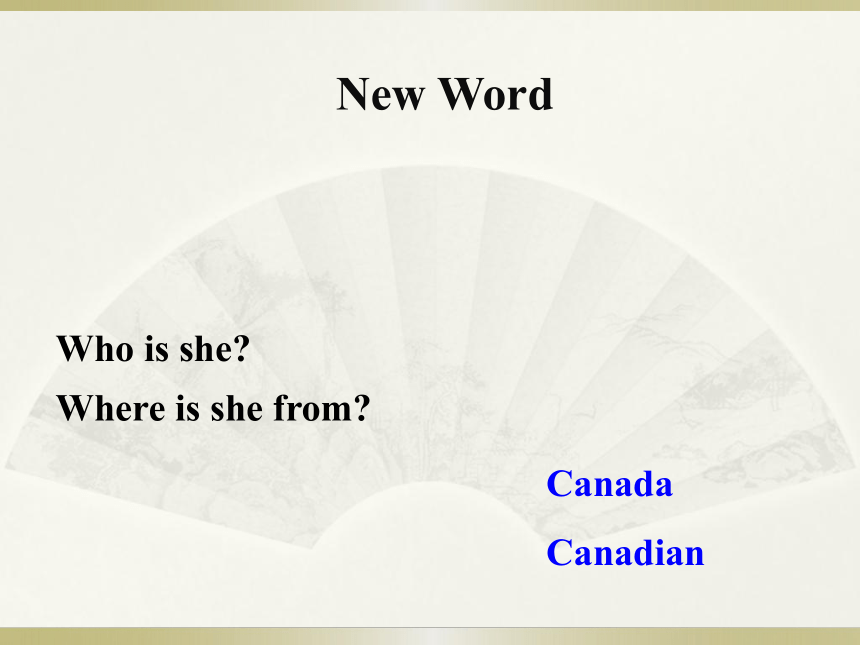
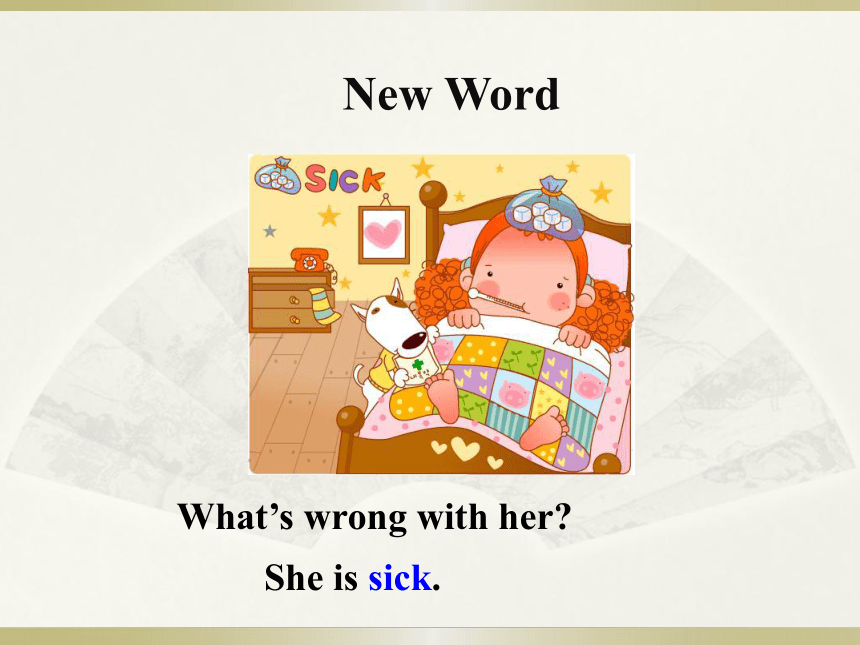

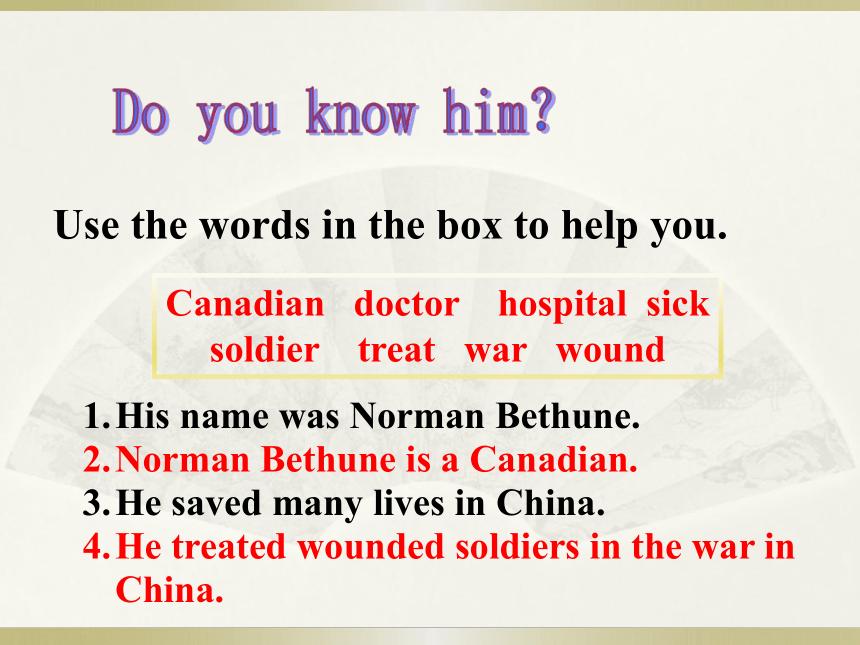
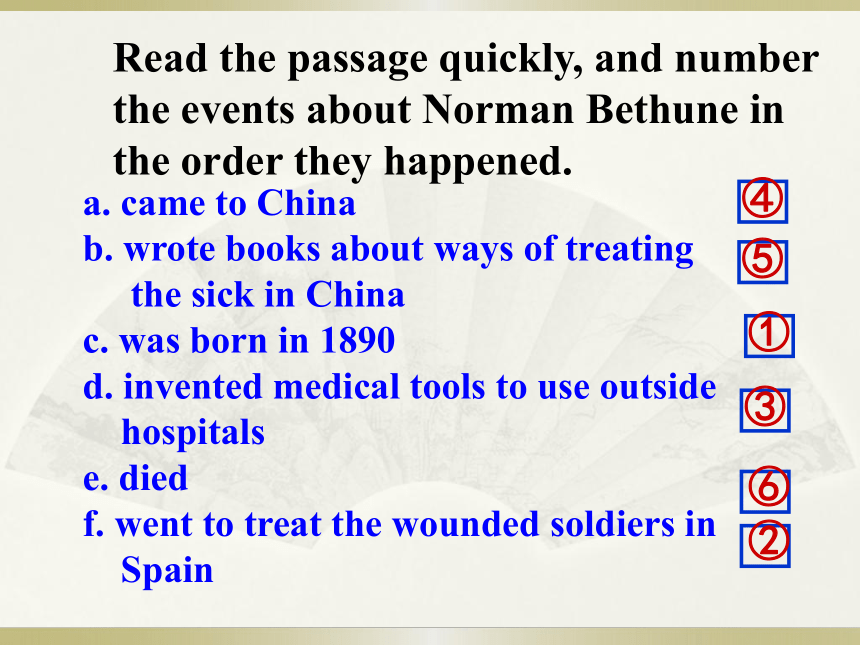

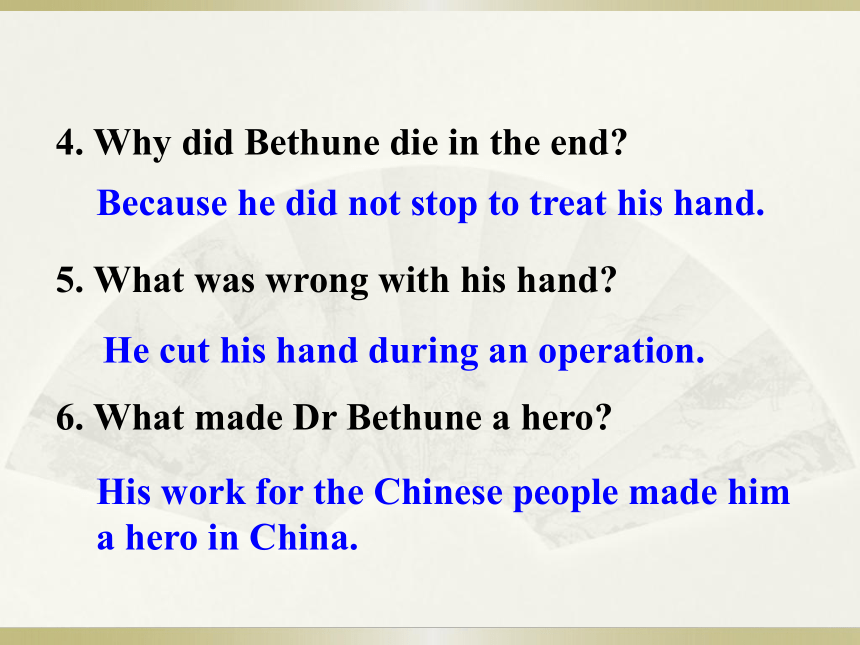
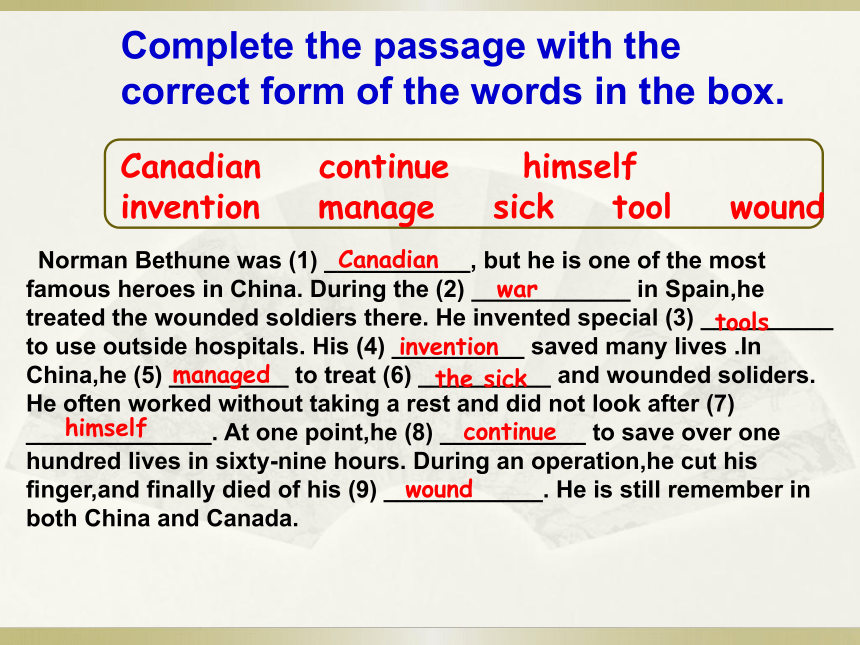
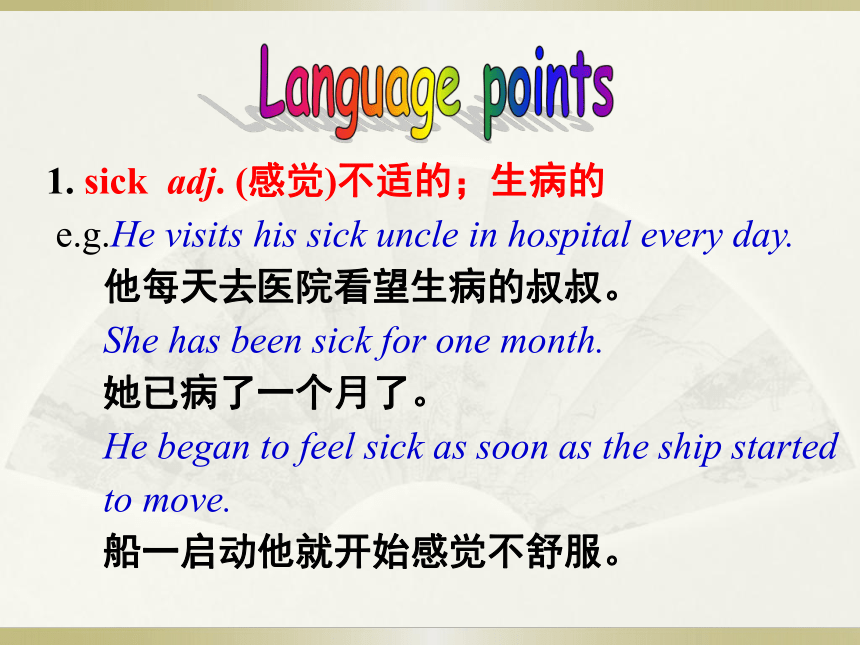
文档简介
(共32张PPT)
Unit 2
There were few doctors, so he had to work very hard on his own.
at a radio station
train hard
win world competitions
gold medals
attend university
once again
complete one’s doctor’s degree
give up
在广播电台
努力训练
赢得世界比赛
金牌
上大学
再一次
完成博士学位
放弃
Warming-up
Who’s your hero Why
Do you want to learn about real heroes Why
Who is she
Where is she from
Canada
Canadian
New Word
What’s wrong with her
She is sick.
New Word
What are they
They are soldiers.
They are in a war.
One soldier is wounded.
Which doctor will treat him
New Word
His name was Norman Bethune.
Norman Bethune is a Canadian.
He saved many lives in China.
He treated wounded soldiers in the war in China.
Use the words in the box to help you.
Read the passage quickly, and number the events about Norman Bethune in the order they happened.
a. came to China
b. wrote books about ways of treating
the sick in China
c. was born in 1890
d. invented medical tools to use outside
hospitals
e. died
f. went to treat the wounded soldiers in
Spain
①
②
③
④
⑤
⑥
Read the passage carefully, and answer the questions.
1. What did he give his life to
2. Why did he invent new ways to treat soldiers
3. What did Norman Bethune do during his stay in China
He gave his life to helping the Chinese people.
Because he saw many soldiers die in the war.
He helped treat the wounded, developed training courses for local doctors and nurses and wrote books.
4. Why did Bethune die in the end
5. What was wrong with his hand
6. What made Dr Bethune a hero
Because he did not stop to treat his hand.
He cut his hand during an operation.
His work for the Chinese people made him a hero in China.
Complete the passage with the correct form of the words in the box.
Canadian continue himself invention manage sick tool wound
Norman Bethune was (1) ___________, but he is one of the most famous heroes in China. During the (2) ____________ in Spain,he treated the wounded soldiers there. He invented special (3) __________ to use outside hospitals. His (4) __________ saved many lives .In China,he (5) _________ to treat (6) __________ and wounded soliders. He often worked without taking a rest and did not look after (7) ______________. At one point,he (8) ___________ to save over one hundred lives in sixty-nine hours. During an operation,he cut his finger,and finally died of his (9) ____________. He is still remember in both China and Canada.
Canadian
war
tools
invention
managed
the sick
himself
continue
wound
1. sick adj. (感觉)不适的;生病的
e.g.He visits his sick uncle in hospital every day.
他每天去医院看望生病的叔叔。
She has been sick for one month.
她已病了一个月了。
He began to feel sick as soon as the ship started
to move.
船一启动他就开始感觉不舒服。
ill 和sick都有“生病的;有病的”之意,但用法并不完全相同。
ill 表示“生病的;有病的”时,一般用作表语,不能作定语;而sick 既可以作表语又可以作定语,如“病人”可以说a sick man 或the sick, 但不能说an ill man 或the ill。
sick 有“恶心的;厌倦的”之意。
ill 作定语修饰名词时是“坏的;邪恶的”之意。
He is an ill man. 他是一个邪恶的人。
知识链接
2. … and died for them.
die for 为了 ······而死;为······而献身;急需(某物)
e.g.Let us remember the brave who died for the
peace of the world.
让我们永远怀念为世界和平献身的勇士们。
I'm dying for a cup of tea.
我很想喝杯茶。
die of 死于(疾病, 感情, 饥寒等)
The beggar died of hunger and cold.
这个乞丐死于饥饿和寒冷。
die from 死于······ (事故, 外伤)
The old man died from a traffic accident.
那位老人死于交通事故。
知识链接
3. …went to Spain in 1936 to treat the
wounded soldiers …
treat v. 医治;治疗
e.g.The doctors were not able to treat this disease.
医生治不了这种病。
The dentist will treat my tooth.
这名牙医将医治我的牙齿。
Which doctor is treating you for your illness
哪个医生在给你看病
cure与treat的用法区别
treat通常强调过程,指对病人进行诊断和治疗,但不含治好的意思。
cure通常强调结果,指治愈某种疾病或某人的疾病
The doctors cured her of cancer.
医生治好了她的癌症。
知识链接
wounded adj. 受伤的
e.g.The wounded policeman is now out of danger.
受伤的警察已经脱离危险。
the wounded 伤员
the与某些形容词连用,相当于复数的普通名词,表示一类人。
the young 青年 the old 老年
the poor 穷人 the rich 富人
the sick 病人
wound n. 伤;伤口
e.g.That was a wound to the child's pride.
那是对孩子自尊心的伤害。
He has a wound in the arm.
他臂上有一处伤。
wound v. 伤;伤害
e.g.The thief wounded her in the arm with his
knife.
小偷用刀子扎伤了她的手臂。
He felt wounded in his honour.
他觉得自己的荣誉受到了损害。
知识拓展
hurt, injure, wound, cut都有“受伤”的意思
hurt为普通用语,既可指肉体上的伤害,也可指精神上、感情上的伤害,多指伤痛。
I hurt my leg badly in the football match.
在那场足球赛中,我的腿受了重伤。
injure比hurt正式,主要指意外事故中损害健康、容貌等,强调功能的损失。
A bullet injured his left eye.
一颗子弹伤了他的左眼。
辨析
wound指枪伤、刀伤、刺伤等皮肉之伤,是出血的、严重的伤,尤其指用武器有意造成的伤口、伤疤或战场上受伤。也可指人们精神上的创伤。
The thief wounded him with a knife.
那小偷用刀刺伤了他。
cut指无意中造成的轻伤。
Don't cut your finger.
别切着手指。
4. He soon realised that people were dying because …
realise v. 了解;意识到;实现
e.g.I hope everyone goes to see this film and
realise the real word.
我希望大家看看这部电影, 去了解真实的
世界。
He didn't realise how late it was.
他并没有意识到已经有多晚了。
She realised her dream at last.
她终于实现了梦想。
dying adj. 垂死的;将要死去的
The little girl cried when she saw her dying
cat.
看到快死的小猫,小女孩哭了。
I will remember it to my dying day.
我至死都不会忘记此事。
be dying for 渴望
die v. 死;枯竭
dead adj. 死的
death n. 死;死亡
知识链接
5. … and managed to saved over a hundred lives.
manage v. 做成;(尤指)设法完成
e.g.Can you manage on your own
你一个人能行吗
How did you manage to get there in time
你们是怎么及时赶到那儿的
I have to manage with 10 dollars till payday.
我得用10块钱支撑到发薪日。
manage to do sth. 设法 /想办法干成某事
manage with 以······应付过去
[注意 ] manage只跟动词不定式,不跟动名词。
manager n. 经理,管理人
manage to do, try to do 的区别
manage to do 指设法做成/完成某事, 含有成功之义; try to do指争取做成某事, 但不一定成功。
e.g.He managed to get the work done with very
little help.
在没有多少帮助的情况下,他把工作完成了。
We tried to stop him smoking in bed but he
would do it.
我们试图阻止他在床上吸烟,但他就是不听。
知识链接
6. Dr Bethune’s work for the Chinese people made him a hero in China.
made him a hero表示“使 他成为一名英雄”。在这里,动词make后面带了复合宾语,him是make的宾语,a hero做宾语补足语。除了名词可以作make的宾语补足语外,形容词、动词原形、介词短语等也可以用来做宾语补足语。
e.g.What made you change your mind
什么使你改变了主意?
You’ve made me very happy.
你让我非常幸福。
You make me want to be a better man.
你使我想成为一个更出色的男人。
The teacher tried his best to make himself a
good friend of his pupils.
那位老师尽力使自己成为学生的好朋友。
Homework
Look at the facts at Page 21 about Yuan Longping and write a passage about him.
Unit 2
There were few doctors, so he had to work very hard on his own.
at a radio station
train hard
win world competitions
gold medals
attend university
once again
complete one’s doctor’s degree
give up
在广播电台
努力训练
赢得世界比赛
金牌
上大学
再一次
完成博士学位
放弃
Warming-up
Who’s your hero Why
Do you want to learn about real heroes Why
Who is she
Where is she from
Canada
Canadian
New Word
What’s wrong with her
She is sick.
New Word
What are they
They are soldiers.
They are in a war.
One soldier is wounded.
Which doctor will treat him
New Word
His name was Norman Bethune.
Norman Bethune is a Canadian.
He saved many lives in China.
He treated wounded soldiers in the war in China.
Use the words in the box to help you.
Read the passage quickly, and number the events about Norman Bethune in the order they happened.
a. came to China
b. wrote books about ways of treating
the sick in China
c. was born in 1890
d. invented medical tools to use outside
hospitals
e. died
f. went to treat the wounded soldiers in
Spain
①
②
③
④
⑤
⑥
Read the passage carefully, and answer the questions.
1. What did he give his life to
2. Why did he invent new ways to treat soldiers
3. What did Norman Bethune do during his stay in China
He gave his life to helping the Chinese people.
Because he saw many soldiers die in the war.
He helped treat the wounded, developed training courses for local doctors and nurses and wrote books.
4. Why did Bethune die in the end
5. What was wrong with his hand
6. What made Dr Bethune a hero
Because he did not stop to treat his hand.
He cut his hand during an operation.
His work for the Chinese people made him a hero in China.
Complete the passage with the correct form of the words in the box.
Canadian continue himself invention manage sick tool wound
Norman Bethune was (1) ___________, but he is one of the most famous heroes in China. During the (2) ____________ in Spain,he treated the wounded soldiers there. He invented special (3) __________ to use outside hospitals. His (4) __________ saved many lives .In China,he (5) _________ to treat (6) __________ and wounded soliders. He often worked without taking a rest and did not look after (7) ______________. At one point,he (8) ___________ to save over one hundred lives in sixty-nine hours. During an operation,he cut his finger,and finally died of his (9) ____________. He is still remember in both China and Canada.
Canadian
war
tools
invention
managed
the sick
himself
continue
wound
1. sick adj. (感觉)不适的;生病的
e.g.He visits his sick uncle in hospital every day.
他每天去医院看望生病的叔叔。
She has been sick for one month.
她已病了一个月了。
He began to feel sick as soon as the ship started
to move.
船一启动他就开始感觉不舒服。
ill 和sick都有“生病的;有病的”之意,但用法并不完全相同。
ill 表示“生病的;有病的”时,一般用作表语,不能作定语;而sick 既可以作表语又可以作定语,如“病人”可以说a sick man 或the sick, 但不能说an ill man 或the ill。
sick 有“恶心的;厌倦的”之意。
ill 作定语修饰名词时是“坏的;邪恶的”之意。
He is an ill man. 他是一个邪恶的人。
知识链接
2. … and died for them.
die for 为了 ······而死;为······而献身;急需(某物)
e.g.Let us remember the brave who died for the
peace of the world.
让我们永远怀念为世界和平献身的勇士们。
I'm dying for a cup of tea.
我很想喝杯茶。
die of 死于(疾病, 感情, 饥寒等)
The beggar died of hunger and cold.
这个乞丐死于饥饿和寒冷。
die from 死于······ (事故, 外伤)
The old man died from a traffic accident.
那位老人死于交通事故。
知识链接
3. …went to Spain in 1936 to treat the
wounded soldiers …
treat v. 医治;治疗
e.g.The doctors were not able to treat this disease.
医生治不了这种病。
The dentist will treat my tooth.
这名牙医将医治我的牙齿。
Which doctor is treating you for your illness
哪个医生在给你看病
cure与treat的用法区别
treat通常强调过程,指对病人进行诊断和治疗,但不含治好的意思。
cure通常强调结果,指治愈某种疾病或某人的疾病
The doctors cured her of cancer.
医生治好了她的癌症。
知识链接
wounded adj. 受伤的
e.g.The wounded policeman is now out of danger.
受伤的警察已经脱离危险。
the wounded 伤员
the与某些形容词连用,相当于复数的普通名词,表示一类人。
the young 青年 the old 老年
the poor 穷人 the rich 富人
the sick 病人
wound n. 伤;伤口
e.g.That was a wound to the child's pride.
那是对孩子自尊心的伤害。
He has a wound in the arm.
他臂上有一处伤。
wound v. 伤;伤害
e.g.The thief wounded her in the arm with his
knife.
小偷用刀子扎伤了她的手臂。
He felt wounded in his honour.
他觉得自己的荣誉受到了损害。
知识拓展
hurt, injure, wound, cut都有“受伤”的意思
hurt为普通用语,既可指肉体上的伤害,也可指精神上、感情上的伤害,多指伤痛。
I hurt my leg badly in the football match.
在那场足球赛中,我的腿受了重伤。
injure比hurt正式,主要指意外事故中损害健康、容貌等,强调功能的损失。
A bullet injured his left eye.
一颗子弹伤了他的左眼。
辨析
wound指枪伤、刀伤、刺伤等皮肉之伤,是出血的、严重的伤,尤其指用武器有意造成的伤口、伤疤或战场上受伤。也可指人们精神上的创伤。
The thief wounded him with a knife.
那小偷用刀刺伤了他。
cut指无意中造成的轻伤。
Don't cut your finger.
别切着手指。
4. He soon realised that people were dying because …
realise v. 了解;意识到;实现
e.g.I hope everyone goes to see this film and
realise the real word.
我希望大家看看这部电影, 去了解真实的
世界。
He didn't realise how late it was.
他并没有意识到已经有多晚了。
She realised her dream at last.
她终于实现了梦想。
dying adj. 垂死的;将要死去的
The little girl cried when she saw her dying
cat.
看到快死的小猫,小女孩哭了。
I will remember it to my dying day.
我至死都不会忘记此事。
be dying for 渴望
die v. 死;枯竭
dead adj. 死的
death n. 死;死亡
知识链接
5. … and managed to saved over a hundred lives.
manage v. 做成;(尤指)设法完成
e.g.Can you manage on your own
你一个人能行吗
How did you manage to get there in time
你们是怎么及时赶到那儿的
I have to manage with 10 dollars till payday.
我得用10块钱支撑到发薪日。
manage to do sth. 设法 /想办法干成某事
manage with 以······应付过去
[注意 ] manage只跟动词不定式,不跟动名词。
manager n. 经理,管理人
manage to do, try to do 的区别
manage to do 指设法做成/完成某事, 含有成功之义; try to do指争取做成某事, 但不一定成功。
e.g.He managed to get the work done with very
little help.
在没有多少帮助的情况下,他把工作完成了。
We tried to stop him smoking in bed but he
would do it.
我们试图阻止他在床上吸烟,但他就是不听。
知识链接
6. Dr Bethune’s work for the Chinese people made him a hero in China.
made him a hero表示“使 他成为一名英雄”。在这里,动词make后面带了复合宾语,him是make的宾语,a hero做宾语补足语。除了名词可以作make的宾语补足语外,形容词、动词原形、介词短语等也可以用来做宾语补足语。
e.g.What made you change your mind
什么使你改变了主意?
You’ve made me very happy.
你让我非常幸福。
You make me want to be a better man.
你使我想成为一个更出色的男人。
The teacher tried his best to make himself a
good friend of his pupils.
那位老师尽力使自己成为学生的好朋友。
Homework
Look at the facts at Page 21 about Yuan Longping and write a passage about him.
同课章节目录
- Module 1 Wonders of the world
- Unit 1 It's more than 2,000 years old.
- Unit 2 The Grand Canyon was not just big.
- Unit 3 Language in use
- Module 2 Public holidays
- Unit 1 My family always go somewhere interesting a
- Unit 2 We have celebrated the festival since the f
- Unit 3 Language in use
- Module 3 Heroes
- Unit 1 She trained hard,so she became a great play
- Unit 2There were few doctors, so he had to work ve
- Unit 3 Language in use
- Module 4 Home alone
- Unit 1 I can look after myself, although it won’t
- Unit 2 I became so bored with their orders that I
- Unit 3 Language in use
- Module 5 Museums
- Unit 1 Don't cross that rope!
- Unit 2 If you ever go to London, make sure you vis
- Unit 3 Language in use
- Module 6 Problems
- Unit 1 If I start after dinner, I'll finish it be
- Unit 2 If you tell him the truth now, you will sho
- Unit 3 Language in use
- Revision Module A
- Module 7 Great books
- Unit 1 We're still influenced by Confucius's idea
- Unit 2 It is still read and loved.
- Unit 3 Language in use
- Module 8 Sports life
- Unit 1 Daming wasn't chosen for the team last time
- Unit 2 He was invited to competitions around the w
- Unit 3 Language in use
- Module 9 Great inventions
- Unit 1 Will computers be used more than books in t
- Unit 2 Will books be replaced by the Internet?
- Unit 3 Language in use
- Module 10 Australia
- Unit 1 I have some photos that I took in Australia
- Unit 2 The game that they like most is Australian
- Unit 3 Language in use
- Module 11 Photos
- Unit 1 He's the boy who won the photo competition
- Unit 2 The photo which we liked best was taken by
- Unit 3 Language in use
- Module 12 Save our world
- Unit 1 If everyone starts to do something, the wor
- Unit 2 Repeat these three words daily: reduce, reu
- Unit 3 Language in use
- Revision Module B
